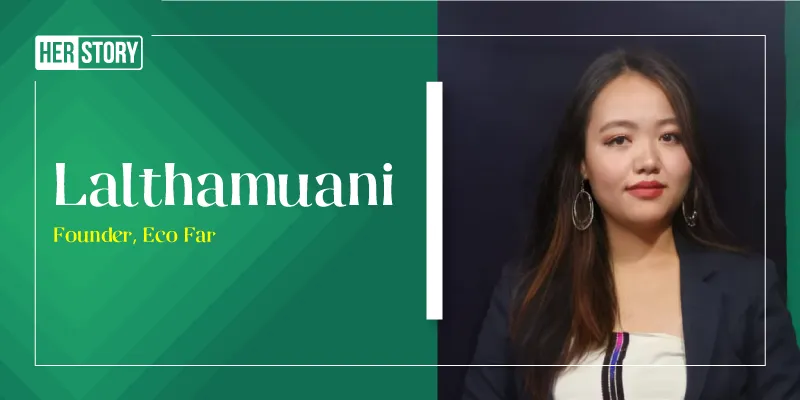Meet Mizoram village’s only BBA grad who is now building a tea estate, supporting 300 farmers
After running small errands, Lalthamuani has now set up Eco Far, a tea business that empowers and supports the livelihood of over 300 farmers in Mizoram’s Leisenzo village.
According to a study by Google and Bain & Company, women entrepreneurship has a direct impact on women empowerment and overall economic development, leading to the creation of 150-170 million new jobs.
In Leisenzo village, which is about 50km away Champhai district in Mizoram, 22-year-old woman entrepreneur Lalthamuani is proving the positive ripple effects of entrepreneurship. Braving poverty and gender stereotypes in the village, she made ends meet by selling household products and became the first person ever from her village to obtain a BBA degree.
Now, the young entrepreneur runs that sells unique tea native to Leisenzo village, and is empowering more than 300 farmers by supporting their livelihood during the pandemic.
In 2020, Lalthamuani won the Pandemic Innovative Challenge organised by the Planning and Program Implementation Department of the Government of Mizoram. She was also among the finalists at the Start Up India Mizoram Yatra and Mizoram Kailawn 2019, a business plan contest organised by the government of Mizoram to promote entrepreneurship.
The journey

For Lalthamuani, the inspiration for running a business came from her mother who used to sell vegetables from door to door. So, when her family was unable to support her high school studies in Sikkim, she began selling household products to support herself.
To further continue pursuing Bachelors of Business Administration in 2018, she founded Eco Far through which she sold sustainable daily utility products like recycled and decorated bottles, and took up some network marketing jobs as well.
With fewer job opportunities and economic activity during the pandemic, farmers who were producing tea only for their consumption till now turned to Lalthamuani – the only person with formal business education in the village – to help them market their tea products.
That is when Eco Far pivoted into a tea estate business early this year.
Although she never sold tea before, the entrepreneur hails from a long line of tea farmers, with an estate that was handed down from her ancestors. “My grandmother often told me that the jungle tea grown here is unique and one ought to become successful making a business out of it with the right skill set,” she recalls in a conversation with HerStory.
Operating on a B2C model through retailers outside the village, Eco Far’s flagship product is a handmade ‘jungle red tea’ that is fast selling in the market. The enterprise now hopes to soon introduce white tea and green tea as well. It also sells directly via social media and supplies to the Ministry of Tribal Affairs, as well as companies in Assam, Dimapur, and Kolkata, among others. At present, it sells about 500 tea pouches in two months.
Building an enterprising village
For villagers of Leisenzo, located in the easternmost region of India, the work begins early by handpicking tea leaves at the break of dawn. The leaves are then dried in the sun manually using traditional methods, followed by packaging and distribution of the tea pouches.
“The business model of Eco Far creates a win-win for the villagers as well as Eco Far’s tea factory, as the enterprise helps the villagers to earn a sustainable livelihood while ensuring an abundant supply of raw material for our factory,” she explains.
Today, she has also formed the Leisenzo Tea Society which has over 300 tea farmers as its members, and is sponsored by the Ministry of Tribal Affairs, Government of India to train and upskill the members on tea processing.
Overcoming challenges
Lalthamuani has lived through some of her most difficult days when she had to endure financial hardships and had to work with a society that believed her pursuing a BBA degree would do no good.
“My parents, too, did not support me initially, thinking business is not an ideal subject for a girl to study but now they see the value. I could not convince them then and had to make my decision but now they see the value of investing in education and support me with the business and everything I do today,” she recalls.
Now, she mitigates challenges on the daily operations of the business, including training more farmers and expanding the market. Lack of road connectivity and other infrastructure is also a logistics hurdle. When she is back in her village, interacting with the outside market via phone is also a challenge.
She says Mizoram lacks a hospitable business environment that not only hampers the fast business growth but also offers limited business opportunities.
She is also part of the Her&Now - Empowering Women Entrepreneurs programme which is implemented by Deutsche Gesellschaft für Internationale Zusammenarbeit (GIZ) GmbH, on behalf of the German Federal Ministry for Economic Cooperation and Development (BMZ), and in partnership with the Ministry of Skill Development and Entrepreneurship (MSDE), Government of India.
YourStory’s flagship startup-tech and leadership conference will return virtually for its 13th edition on October 25-30, 2021. Sign up for updates on TechSparks or to express your interest in partnerships and speaker opportunities here.
For more on TechSparks 2021, click here.
Edited by Kanishk Singh









